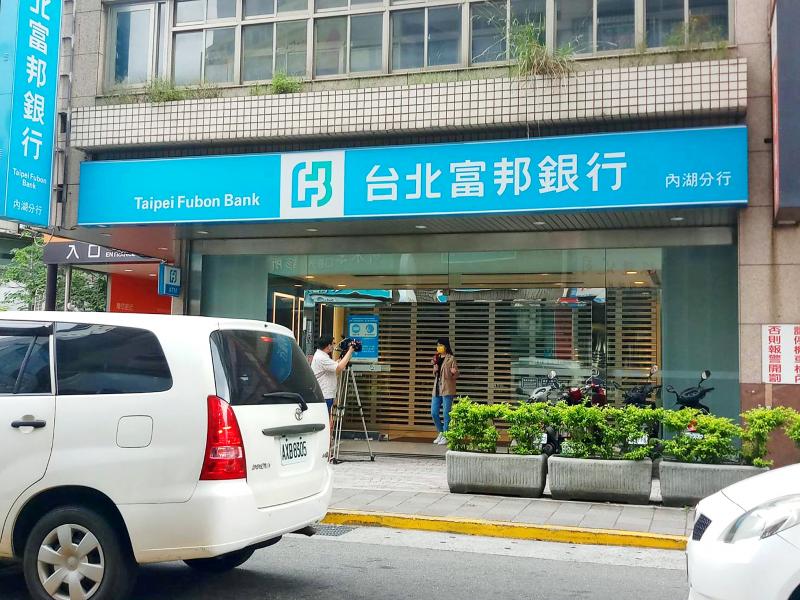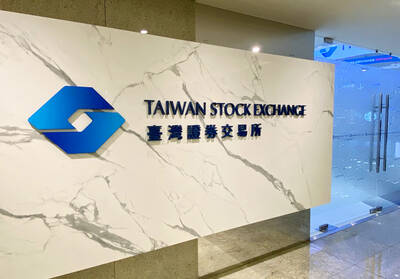Taipei Fubon Commercial Bank’s (台北富邦銀行) board of directors yesterday approved a proposal to increase investment in the Web-only Line Bank Taiwan Ltd (連線商業銀行) by NT$2.195 billion (US$73.88 million), which is expected to raise its stake in the virtual bank from 25.1 percent to 27.18 percent.
Taipei Fubon would remain the second-largest shareholder in Line Bank after Line Financial Taiwan Corp (台灣連線金融科技), which holds a 49.9 percent stake.
Taipei Fubon’s decision came as Line Bank seeks to increase its paid-in capital by NT$7.5 billion after its accumulated pretax losses approached one-third of its paid-in capital of NT$10 billion.

Photo: Yang Hsin-hui, Taipei Times
Line Bank plans to first reduce its capital by NT$2.5 billion to cut losses and then increase capital by NT$7.5 billion, Taipei Fubon said.
CTBC Bank (中國信託銀行), which has a 5 percent stake in Line Bank, has yet to decide whether to boost its investment in the virtual bank, while other stakeholders Standard Chartered Bank (Taiwan) Ltd (渣打國際商業銀行) and Union Bank of Taiwan (聯邦銀行) said they would take part in the recapitalization scheme.
Line Bank is scheduled to hold a shareholders’ meeting tomorrow to discuss the capital increase plan.

Taiwan Semiconductor Manufacturing Co (TSMC, 台積電) secured a record 70.2 percent share of the global foundry business in the second quarter, up from 67.6 percent the previous quarter, and continued widening its lead over second-placed Samsung Electronics Co, TrendForce Corp (集邦科技) said on Monday. TSMC posted US$30.24 billion in sales in the April-to-June period, up 18.5 percent from the previous quarter, driven by major smartphone customers entering their ramp-up cycle and robust demand for artificial intelligence chips, laptops and PCs, which boosted wafer shipments and average selling prices, TrendForce said in a report. Samsung’s sales also grew in the second quarter, up

LIMITED IMPACT: Investor confidence was likely sustained by its relatively small exposure to the Chinese market, as only less advanced chips are made in Nanjing Taiwan Semiconductor Manufacturing Co (TSMC, 台積電) saw its stock price close steady yesterday in a sign that the loss of the validated end user (VEU) status for its Nanjing, China, fab should have a mild impact on the world’s biggest contract chipmaker financially and technologically. Media reports about the waiver loss sent TSMC down 1.29 percent during the early trading session yesterday, but the stock soon regained strength and ended at NT$1,160, unchanged from Tuesday. Investors’ confidence in TSMC was likely built on its relatively small exposure to the Chinese market, as Chinese customers contributed about 9 percent to TSMC’s revenue last

Taiwan and Japan will kick off a series of cross border listings of exchange-traded funds (ETFs) this month, a milestone for the internationalization of the local ETF market, the Taiwan Stock Exchange (TWSE) said Wednesday. In a statement, the TWSE said the cross border ETF listings between Taiwan and Japan are expected to boost the local capital market’s visibility internationally and serve as a key for Taiwan becoming an asset management hub in the region. An ETF, a pooled investment security that is traded like an individual stock, can be tracked from the price of a single stock to a large and

Despite global geopolitical uncertainties and macroeconomic volatility, DBS Bank Taiwan (星展台灣) yesterday reported that its first-half revenue rose 10 percent year-on-year to a record NT$16.5 billion (US$537.8 million), while net profit surged 65 percent to an unprecedented NT$4.4 billion. The nation’s largest foreign bank made the announcement on the second anniversary of its integration with Citibank Taiwan Ltd’s (花旗台灣) consumer banking business. “Taiwan is a key market for DBS. Over the years, we have consistently demonstrated our commitment to deepening our presence in Taiwan, not only via continued investment to support franchise growth, but also through a series of bolt-on acquisitions,” DBS